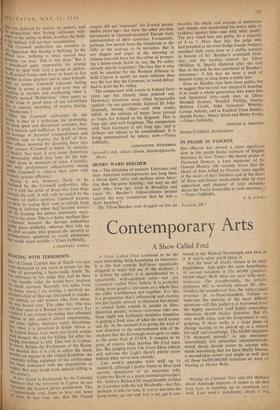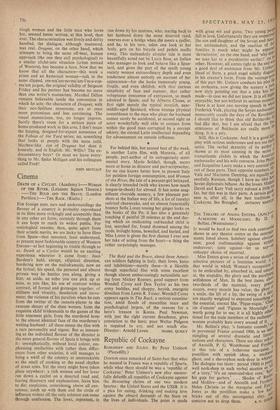Contemporary Arts
A Show Called Fred
A Show Called Fred continues to be the most interesting thing happening on television. It is the first comedy half-hour specifically designed to make full use of the medium; it is written by adults; it is spearheaded by a remarkably well-equipped actor—not just comedian—called Peter Sellers. It is probably doing more good to television as a whole than the other worthinesses put together. For this is a programme that's influencing and exciting not just people already in television but people in related tields outside it, people in films, theatrical people, writers—everyone who sees these slight but brilliantly inventive insanities is getting a fresh view of what the small screen can do. At the moment it is giving the kind of new direction to the entertainment side of the medium that the Kavanagh team gave to radio in the great days of 1TMA. It remains to be seen, of course, what stamina the Fred team has. But judging from The Goon Show (which still enlivens the Light) there's plenty more behind what we've seen already.
Last week's episodes were well up to standard, although I prefer Footo to Moe (and entirely disapprove of an anxiously jolly Catherine Boyle as a guest commercial-reader). Mr. Sellers's Richard III magnificently melded Sir Laurence with the lad Bluebottle—but this. perhaps, is talk for fans. If you've not seen the programme. go out and buy a set, get it con-
verted to the Wicked Wavelength and look at it If you're alive you'll enjoy it.
Not the least of Fred's virtues is its total Englishness. And quite the most humiliating of current vexations is The 64,000 Question. 64,000 what? Well, bless our poor little souls. sixpences. .The paraphernalia, the jovially pompous MC (a woefully miscast Mr. Des- monde), the soundproof box, the embarrassed presence of ex-Superintendent Fabian to supervise the opening of the more difficult questions—all this gadgetry is borrowed from the highly successful (and highly rewarding) American 64,000 Dollar Question. But it's only wortli using, and the programme is only gripping, if there really is a large piece of change waiting to be picked up as a reward for skill and knowledge. The 64,000 sixpences (`A thousand pounds,' as one announcer interestingly but somewhat idiosyncratically styled them) should prove to anyone who needs convincing that we have finally become a second-class power and might as well save all those 64,000.000,000 sixpences we keep on blueing at Monte Bello.
Staying on Channel' Nine and still thinking about American imports—it seems to roe that Gan Law is standing up to, repetition very well. Last week's instalment, about a big, tough woman and the little man who loves her, seemed better written, at this level, than ever. The characterisation was firmly and deftly handled, the dialogue, although mannered, was real. Dragnet, on the other hand, which attempts to bring the same off-beat, human approach (the one they call psychological) to a similar cliche-istic situation (crime instead of Western), has become a bore. Now that we know that all the characters—this week a priest and an hysterical woman—talk in the same clipped, yes-ma'am-no-ma'am-I'm-a-cop- ma'am jargon, the original validity of Sergeant Friday and his partner has become no more than one writer's mannerism. Marshal Dillon remains believable inside the convention in which he acts; the characters of Dragnet, with their neo-Spillane monotone, are at once more pretentious and less convincing. The visual mannerisms, too, no longer impress. Surely there's room for a serious piece of home-produced work in this area. I don't mean the limping, designed-for-export nonsenses of the Fabian of the Yard series; no, something that looks at people with the same cold, Mayhew-like eye of Dragnet but does it honestly, and in English. Mr. Willis? The ex- documentary boys? Or must we leave every- thing to Mr. Spike Milligan and his colleagues called Fred?
JOHN METCALF











































 Previous page
Previous page